"Education is an admirable thing, but it is well to remember from time to time that nothing worth knowing can be taught." -Oscar Wilde
As many of you know, last weekend I launched a suggestion box here on the site, and I've been overwhelmed by the response: about fifty of you have sent something in to me in the first less-than-a-week of this alone!
 Image credit: Thao Nelson of http://mycredo.wordpress.com/.
Image credit: Thao Nelson of http://mycredo.wordpress.com/.
So, let's start answering them! There are more than enough excellent questions and suggestions to keep me busy for a long time, but with the new academic year starting up, one of them caught my eye in particular, from a high school student named James:
Dear Ethan, as a relatively young person (high school) who reads your blog and is interested in science I really would love you to write more about physics or science in general as a career path. I have read your previous blog post on this topic here. In it you mention not doing what university will eventually teach (as was my plan before reading your post), but by researching things which fascinate me now to develop imagination and ways of thinking. For me, that is reading blogs like yours, watching educational channels on YouTube such as sixtysymbols and reading books. However, I really would like more guidance on how at my age I can develop those skills or do things things to put me in the direction of scientist or physicist. In conclusion, my question/suggestion is can you give more guidance or resources to young people who are interested in science and want to pursue a career in it?
This is one of the toughest types of questions to answer, and I'll explain why (before answering it).
There is this mistaken assumption that you -- and I'm not picking on you, but speaking about all of us in general -- are good at knowing exactly what narrow, specialized thing we want to do, and also that will be the thing we want to do for the rest of our lives. So let me tell you some things that may (or may not) surprise you.
1.) You will grow and change as you discover new things. This is not an admonishment of what you don't yet know; this is a call for you to recognize that we are learning new things all the time, and that means that the thing you'd be most excited to do doesn't exist right now. 60 years ago, there was no such thing as "planetary science," because the science of other planets was a total unknown. 30 years ago, nanotechnology was a pipe dream. 20 years ago, were certain that there was no such thing as dark energy. And "junk DNA" might not be junk at all, as we're only learning now.
Do any of these pique your interest? My point is that the career you might wind up having down the road may not even exist right now. Don't try to prepare for the one thing you think you want more than anything else to the exclusion of everything else. Learn a variety of things; surely your love of learning isn't limited to just one narrow thing.
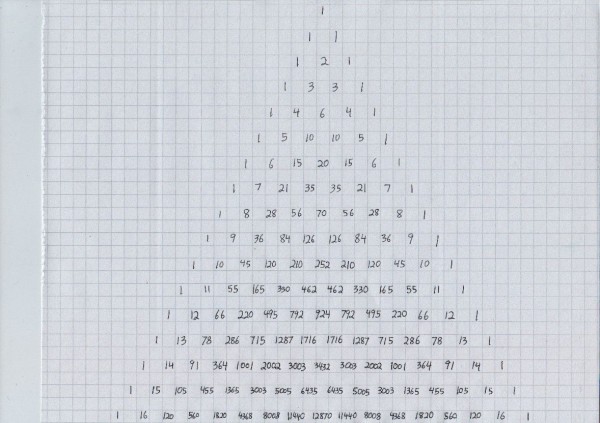 Image credit: Will Jagy of http://math.stackexchange.com/.
Image credit: Will Jagy of http://math.stackexchange.com/.
2.) "Useless" skills are rarely useless. I remember my first year in graduate school; I was in my electromagnetism class, which consisted of a lot of finding solutions to partial differential equations. Here's a funny set of facts for you:
- As an undergraduate, I was a B- student (at best) when it came to electromagnetism.
- I hated my undergraduate math courses (and the professor who taught them) that covered the techniques we were using now, in this class.
- And I had taken time off after college -- against the advice of every physics professor -- to teach high school before applying to graduate school.
Why is that funny? Because you might assume that these facts put me at a tremendous disadvantage. Well, they did. But there were components of those problems that I was actually better at than everyone else in my class; I had advantages too. Yes, in some ways my toolkit (of problem solving) was a little deficient, and I had to work harder than everyone else to shore up those weaknesses. But I also had skills and talents that no one else had, because I spent time honing them. I could do ridiculous combinatorics in my head; I could see integral solutions to certain types of problems before anyone else; I could decompose problems into spherical harmonics more quickly than I'd ever realized. Yes, these skills weren't the things I was supposed to have learned, but I had them and others didn't, and that made me uniquely valuable.
Which brings up another important point...
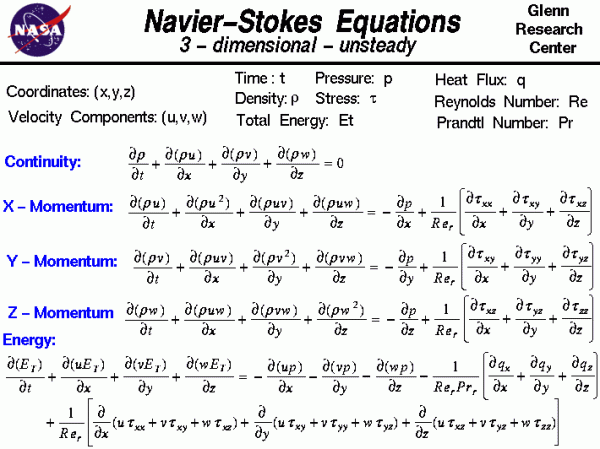 Image credit: NASA, Tom Benson, Glenn Research Center, via http://www.grc.nasa.gov/.
Image credit: NASA, Tom Benson, Glenn Research Center, via http://www.grc.nasa.gov/.
3.) You will get better at the things you put your effort into. Do you see what word I chose? Effort. Not, as people commonly assume, time. When you're trying to acquire a new skill, trying to learn how to solve-and-attack a new class of problems, trying to learn a new technique, the amount of time it will take you to become competent at it will vary tremendously. But it's always going to require effort, and a sustained effort, until you know it and are as adept with it as you want.
You develop those skills by doing whatever it is you're trying to become good at. If you want to paint, you paint. And you paint progressively more intricate, difficult paintings. If you want to master a technique, you practice that technique, you apply it in as many ways as you can think of, and you learn it inside-and-out. And if you want to become good at an aspect of theoretical physics, you practice by solving problems. Don't skimp on the hard ones; work up to them and don't give up until you take them down! Which brings up another couple of points...
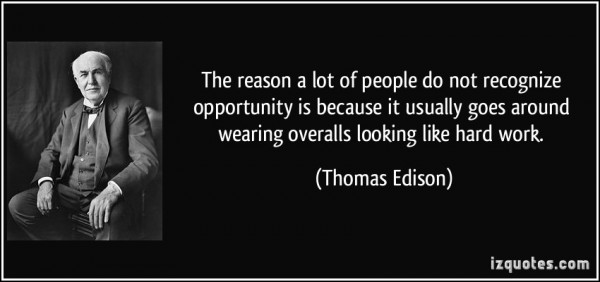 Image credit: http://izquotes.com/, quote by Thomas Edison.
Image credit: http://izquotes.com/, quote by Thomas Edison.
4.) If you don't enjoy the work you do to gain these skills, you aren't going to enjoy that work in the future. A lot of times, I've seen people take the mindset of, "well, I hate what I'm doing now, but if I just jump through these hoops, I'll be able to do the things I want to do." That's all well-and-good, but are you sure that the "things you want to do" don't involve just doing more of the work you hate?
You are constantly going to be using the skills you've acquired, and if you don't love the day-to-day journey of doing that work, what makes you think that doing more of that work will be satisfying? Because it's in the service of some greater problem that you are interested in? Not likely.
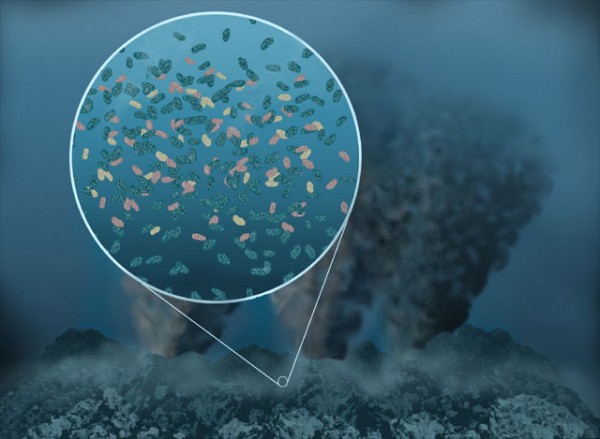 Image credit: ©Lunar and Planetary Institute, 2013 / USRA, via http://www.lpi.usra.edu/.
Image credit: ©Lunar and Planetary Institute, 2013 / USRA, via http://www.lpi.usra.edu/.
5.) Start thinking about the big questions now, but... It's the big questions that lure us in. In biology, it's often the evolution and origin of life; in cognitive science, it's the question of consciousness and where it comes from; in physics, it's pondering the fundamental nature of matter or spacetime or the fate of the Universe. You'll read about then, you'll listen to very smart people's opinions about then, and you'll develop ideas about them. But...
6.) Do not become too attached to these ideas! As you learn more, you will be required to revise your understanding of those ideas, because -- and I guarantee you this -- your ideas about what is already known are incomplete and flawed. This is not a knock at you; this happens to everyone. I hear stories all the time about a kid genius who's doing incredible, advanced things, and to be honest, I find it tiresome. Yes, there are some teenagers who are presently at the level I was at when I was a graduate student, and that in itself is very impressive. But they're not overthrowing relativity, they're not solving string theory, and they're not disproving quantum mechanics: no one is. They may be working on understanding those things, they may be learning about the limits of our understanding there, and -- I'm not going to lie -- that's incredible stuff. But if they want to move forward, and if anyone studying these things wants to move forward, they're going to have to come to terms with the fact that some of the details, ideas and conclusions that are in their head are wrong, and need to be replaced with what's correct. Many scientific careers have ground to a screeching halt because one person was simply too arrogant to say, "oh, that's evidence I can't account for, and so my idea needs revising, reconsidering, or is just wrong."
There's no one, universal "oh, just do this and you'll have a career doing what you want to do" piece of advice to give out. Learn what you love and love what you learn. Read a diversity of materials, but look out for self-promoters, quacks and charlatans. Practice working at the things you love, work to become at least competent in your areas of weakness. Solve problems; learn diverse techniques to do so. Get together in groups and present to each other; your first time teaching something offers you a greater learning opportunity than any of your students. And more generally...
 Image credit: Amanda Kidd of http://thistimeimeanit.com/.
Image credit: Amanda Kidd of http://thistimeimeanit.com/.
Have a life beyond your work. Have some fun. Try new things. Get outside. Use your body. Take risks, get hurt, get better. Talk to people, and keep the interesting ones around. Be kind, be generous, and be open-minded. Push yourself beyond your comfort zone. Don't become a one-dimensional caricature; you are not on the Big Bang Theory and you wouldn't want to be. (The actual theory is far more interesting, I promise.)
And keep questioning, and keep learning. When you understand not just what we know but also how we know it, it's among the best feelings in the world. Don't forget to share it with those you encounter along the way. And most of all, be honest with yourself. Don't wake up one day to discover that you're old, and you didn't live the life you wanted. In the immortal words of Frank Zappa,
“If you end up with a boring miserable life because you listened to your mom, your dad, your teacher, your priest, or some guy on television telling you how to do your shit, then you deserve it.”
It's your one life here in this Universe with your brain, your body, your thoughts, your experiences, and your choices. If you need some more advice for down the road:
- For biology class,
- For teenagers in general,
- For aspiring teenage scientists,
- For hopeful astronomers,
- For those considering grad school,
- For those starting physics grad school,
- For those getting overworked in grad school,
- and for those writing their dissertation.
Now go get 'em. And to everyone else who has a question or suggestion, drop me a line; I'll try to do one every week!

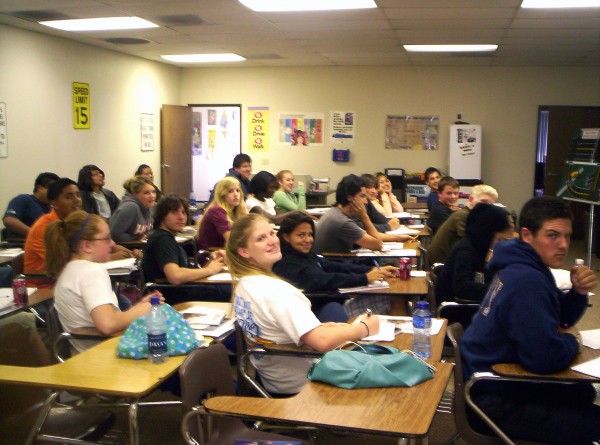


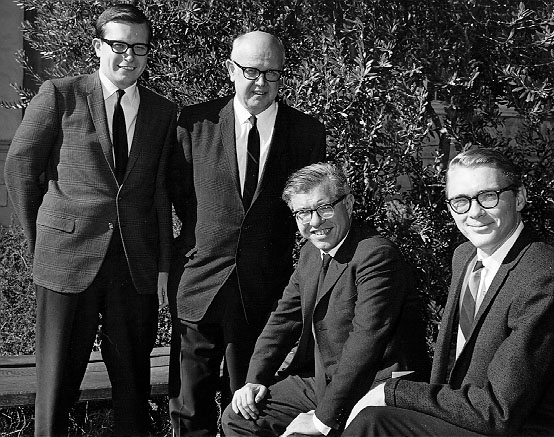

Great post, excellent advice. I'm now doing a very different kind of science than I originally trained in, and I'm happy doing it.
I can't resist a bad pun, though, especially not a bad nerdy pun. You say you were "a B- student ... when it came to electromagnetism" - well, that runs circles around an A in electromagnetism.
This doesn't only happen to scientists, that they don't know what the job will be. I was trying for grocery store work when I moved to Portland to support my not yet wife in her grad school for MSW. My job hunt uncovered a trainee drafter position, will train, no exp. necessary. I took it and wound up after some big big effort with a machine design career totally on the job training. What I brought to the table was high school math, a one early high school semester of drafting (this was 12 years later) and a good head for logic. I lied about being able to print (though I didn't know I was lying). I literally knew next to nothing except that there was such a thing as an engineering career. That was 1973. I retired this year, 2013.
The ENCODE hype notwithstanding, most of our DNA is in fact junk. Check out http://arstechnica.com/staff/2012/09/most-of-what-you-read-was-wrong-ho… or any of the numerous articles at Sandwalk - http://sandwalk.blogspot.com
"Junk" being defined as "We don't know what it does". Either because it USED to do something, but doesn't or cannot any more, doesn't have anything to do now, or has never expressed its abilities due to lack of opportunity.
A genetic algorithm was used to produce a timer signal comparator in a FPGA and the result used two or so gates that were not connected to anything, but if you turned those gates off, it would no longer work.
Something to consider when you think of "junk DNA".
Thank you Ethan. This is exactly what I was looking for! You somehow knew exactly what I was thinking, doing, and my preconceptions; making your advice really relevant to me. All I can say is this post has been truly helpful (even inspiring) and I thank you for doing it.
I might add that it can make a significant difference if the instructor has an enthusiasm for the subject. My first calculus course in college was taught by a completely lackluster TA. I could work a problem if it resembled the example he gave in class, but I had no Idea what I was doing. The class just got more difficult so I dropped out. It was an absolute requirement for electrical engineering and I dreaded attempting it again.
My next try at the class was remarkable. It was taught by a very young female TA who introduced herself and told us how she love target shooting and riding her horses. Then (and I'll never forget) her eyes lit up and she exclaimed with tremendous enthusiasm "Do you have any Idea what you can do with calculus?" Continuing in that same elevated excitement, she actually began to describe it's usefulness, starting with rotating cross sections to derive volumes. Her delivery was stunning. I was delighted. I never got any of this from my first previous insructor. It made perfect sense.
Sorry. My computer experienced a weird blip and proceeded to post my unfinished and unedited comment above.
To conclude:
I never got any of this from my first previous instructor. Now calculus made perfect sense. I aced my tests and got a 4.0 for the class.
Side note:
That instructor made calculus so relevant that I immediately applied it to some useful cut/fill quantity calculations in my civil engineering job at our local airport. Oddly, the chief engineer flipped. Although way more expedient and dead accurate, my boss told me nobody in our department was going to want to cross-check what I did (a requirement before releasing a job for bids). He made me quit using calculus. Sheesh!
Re: 2.) “Useless” skills are rarely useless
I agree. You may not realize this until it occurs. I hated my introduction to trigonometry in advanced classes in high school. I remember seriously deciding then and there that I would never be involved in trig again for the rest of my life -ever!. Trigonometry was unnecessary and totally irrelevant.
Oh yeah.... think again. Fast forward to an unintended universe of trigonometry. I begin a drafting and surveying career (continuous calculations). I begin playing music (frequencies / harmonics) and building my own sound effects (waveform transformations). I decide to get and electronics degree (everything AC). My passions become astronomy, physics, and other sciences with periodic events. Possibly more so than any, as Survey Party Chief, I viewed every decision through a "lens" of trigonometry. Who woulda thunk?
Anything you learn in math will make a multitude of things more obvious and understandable. Your interests broaden. Enjoyment and appreciation are unexpected side benefits.
It pains me to say this, but one should do a lot of research on the jobs available to your chosen career path, before embarking on it. Most of the sciences are actually terrible career paths, because the market is oversaturated with Ph.D.'s, and there are no jobs. The world just doesn't need more university professors. In fact, with coming revolutions in online education, it will need fewer.
So, if you want to be a scientist, devote a lot of thought to how you will get paid. Groveling for grants is a losing proposition, the amount of available money is crashing. Think outside the box. Start a nonprofit, work with a company, have a backup plan.
We cannot afford to lose science. But the path a young person beginning now follows will be wildly different from his predecessors. You're simply not going to get a Ph.D., apply to faculty positions, and have a "career" the way your professors did. I don't know what the path will be, the next generation will have to help define it.
Excellent advice, Ethan.
I would also suggest: start thinking in scientific methods, and apply them to everyday life.
Study the methods that scientists use for solving problems. Study experimental method, mathematical logic, probability & statistics, and while you're at it study epistemology.
Then apply what you learn, to your own life: what you believe is real, what you think about politics & public policy, how you evaluate others' arguements & positions, various practical problems at work, etc. The more you use these skills in everyday life, the more conversant you'll become with them until doing it is second nature.
Very quickly you'll find that you're "thinking outside the box" as far as the common spectrum of ideas and opinions are concerned. The downside of this may be that you can't apply conventionally binary categories to your ideas, e.g. you won't be able to say "I _am_ (a liberal, a conservative, whatever)," but the upside is that the kind of people you probably want to surround yourself with, will greet that kind of thinking with interest rather than dismissing it.
Over time you'll find that you have original solutions to various problems, for example as MandoZink did when applying calculus to a civil engineering problem. (The fact that his/her company couldn't cross-check the calculus could have been overcome in time, by various means such as working the problem both ways and showing convergent solutions, or by making predictions that could later be checked against results. In business, results count.)
Re. Bob: Just say "decline & fall." The solutions to this are many and interrelated, and involve public policy questions that are often highly politicized. But the conclusion to all of them, is to be fully engaged as a citizen, learn how to analyze others' positions, and make persuasive arguements without relying on unethical tactics, and most of all getting all of your peers registered to vote and then making sure they do so.
The future doesn't "happen", and "happenstance" is not a stance. The future is what we make it: by will and by effort.
I think it was Mae West who said "You only go around once in life, but if you do it right, that's enough!"